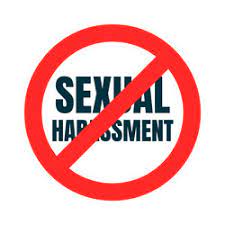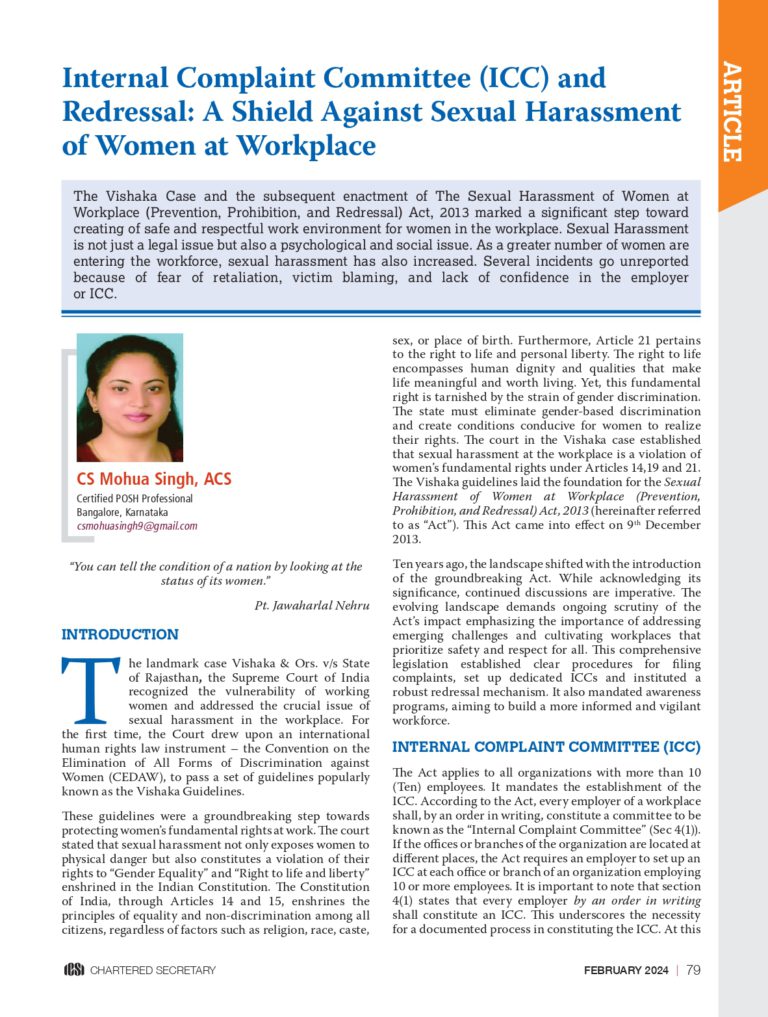What are the responsibilities of the Employer?
In 2013, the Government of India introduced the Sexual Harassment of Women at Workplace (Prevention, Prohibition, and Redressal) (POSH) Act. In alignment with the principles articulated in the Vishaka judgment, the POSH Act aspires to guarantee women’s entitlement to workplace equality, ensuring that they can pursue their professional endeavours free from the scourge of sexual harassment. The Act put the following 3 obligations on the Employers:
- Prohibition: The prohibition of sexual harassment in the workplace.
- Prevention: The proactive measures taken to prevent instances of sexual harassment.
- Redress: The establishment of mechanisms to address and rectify incidents of sexual harassment when they do occur.
To accomplish the above obligations, the Employer must take the following basic steps:

It is important to note that the Act provides a civil remedy to women and is in addition to laws that are currently in force. Consequently, any woman who wishes to report instances of sexual harassment at the workplace has the right to take recourse to both civil and criminal proceedings.
Is the establishment of an Internal Complaint Committee Mandatory for Employer?
YES, the constitution of the Internal Complaint Committee (ICC) is mandatory. The POSH Act requires an employer to set up an ICC at each office or branch, of an organization employing 10 or more employees.
Penalties under the POSH Act for non-constitution of ICC.
- Fine: The employer shall be liable to pay a fine of up to Rs. 50,000 if the employer fails to constitute ICC.
- Repeated Offenses: In case of repeated offenses, the penalty may be doubled up to Rs. 1,00,000/-
- Cancellation of License: In extreme cases, the appropriate authority may also have the power to cancel or withdraw any license, registration, or approval granted to the employer.
For some employers, the amount of Rs. 50000/- may appear to be trivial but it must be noted that apart from imposing penalties as per the POSH Act, the court has the discretion to order other amounts from employers as damages as well. Two of such cases are discussed below:
In the case of Ms.G vs. Isg Novasoft Technologies, the Madras High Court on 2nd September 2014 directed the company to pay Rs 1.68 crore as damages for sexual harassment to an aggrieved woman.
In the matter of Mrs. Arvinder Bagga & Ors. v. Local Complaints Committee, District Indore & Ors., W.P. No. 22314 of 2017, the Indore Bench of the Madhya Pradesh High Court has imposed a fine of Rs. 50,000.00 on Medanta Hospital, Indore, for its failure to establish an Internal Complaints Committee (ICC) in accordance with the POSH Act, 2013. Additionally, the court has mandated the hospital to compensate the complainant with a sum of INR 25 Lakhs for neglecting to address her complaint of sexual harassment. This judgment aligns with the findings presented by the Local Complaints Committee, Indore.
The Court resolved W.P.No.22314/2017 and W.P.No.22317/2017 by issuing the following directives:
- The complainant is entitled to a compensation of Rs.25,00,000/- to cover the pain and suffering, loss of reputation, emotional distress, and financial loss endured for eighteen months, despite no fault on her part, resulting in the deprivation of her right to live with dignity. The hospital is required to make this compensation payment within 8 weeks; failure to do so will attract interest at the rate of 09% (nine) per annum.
- The hospital must provide the complainant with a character and experience certificate for the period of her employment, without attaching any stigma to her image.
- The hospital is directed to pay a penalty of Rs.50,000/- (Rupees fifty thousand only), if not already paid, due to the absence of an Internal Committee.
Supreme Court directives for effective implementation of POSH ACT
In a landmark judgment in the case of Aureliano Fernandes v. State of Goa on 12th May 2023, the Supreme Court of India addressed serious lapses in implementation and diligent compliance with the POSH Act. In this case, the honourable Supreme Court of India issued directives for enhanced enforcement of the POSH Act. The directives are as follows:
- Review of Implementation: The Union of India, all State Governments, and Union Territories are directed to undertake a timebound exercise to verify whether all the concerned Ministries, Departments, Government organizations, authorities, Public Sector Undertakings, institutions, bodies, etc. have constituted ICCs/LCs/ICs, as the case may be and that the composition of the said Committees is strictly in terms of the provisions of the POSH Act.
- Online Transparency: Necessary information regarding the constitution and composition of the ICCs/LCs/ICs, details of the e-mail IDs and contact numbers of the designated person(s), the procedure prescribed for submitting an online complaint, as well as the relevant rules, regulations, and internal policies, are made readily available on the website of the concerned Authority/Functionary/ Organisation/Institution/Body, as the case may be. The information furnished shall also be updated from time to time.
- Training and Orientation: The authorities/management/employers shall regularly conduct orientation programs, workshops, seminars, and awareness programs to upskill members of the ICCs/LCs/ICs and to educate women employees and women’s groups about the provisions of the Act, the Rules, and relevant regulations.
- Effective Harassment Handling: Immediate and effective steps shall be taken by the authorities/ managements/employers to familiarize members of the ICCs/LCs/ICs with their duties and the way an inquiry ought to be conducted upon receiving a complaint of sexual harassment at the workplace, from the point when the complaint is received, till the inquiry is finally concluded and the Report submitted.
What is “SHe- BOX”?
Sexual Harassment electronic Box (SHe-Box) is an effort of the Government of India to provide a single window access to every woman, irrespective of her work status, whether working in an organized or unorganized, private or public sector, to facilitate the registration of complaints related to sexual harassment. Any woman facing sexual harassment at the workplace can register her complaint through this portal. Once a complaint is submitted to the ‘SHe-Box’, it will be directly sent to the concerned authority having jurisdiction to act on the matter.
A prominent aspect of the SHe-Box is its capability to facilitate continuous oversight of investigative proceedings, promoting transparency and accountability. This feature enables both the complainant and the Ministry of Women and Child Development to monitor the advancement of investigations, thereby ensuring the delivery of justice and the maintenance of secure and respectful workplace environments for all employees.
To be continued …..




